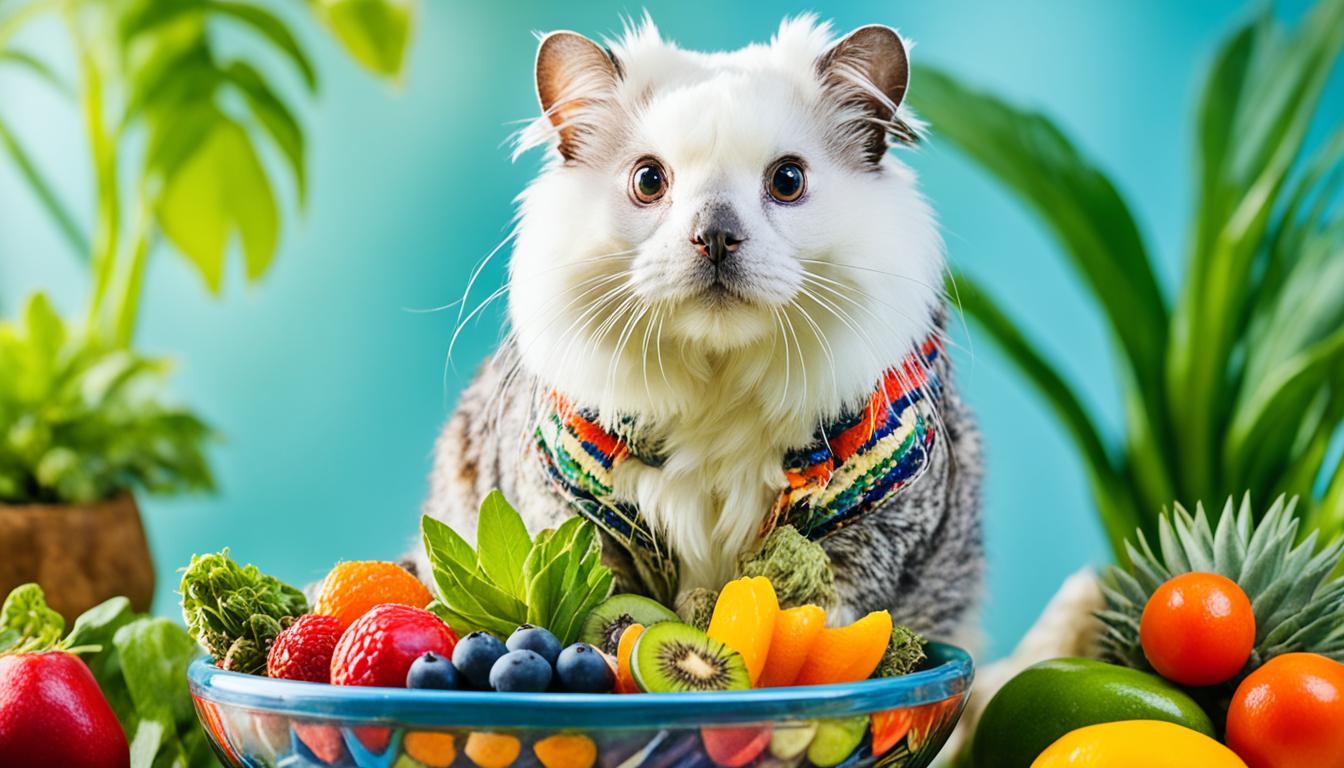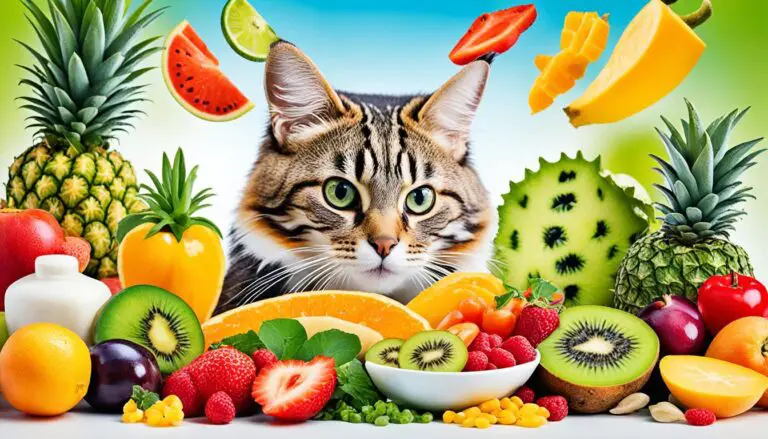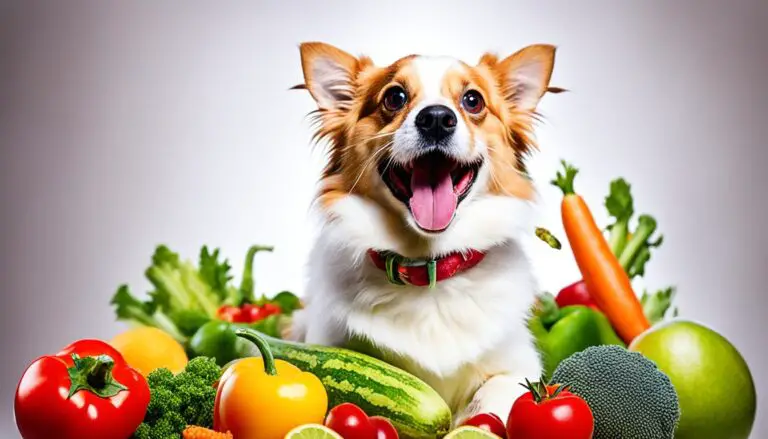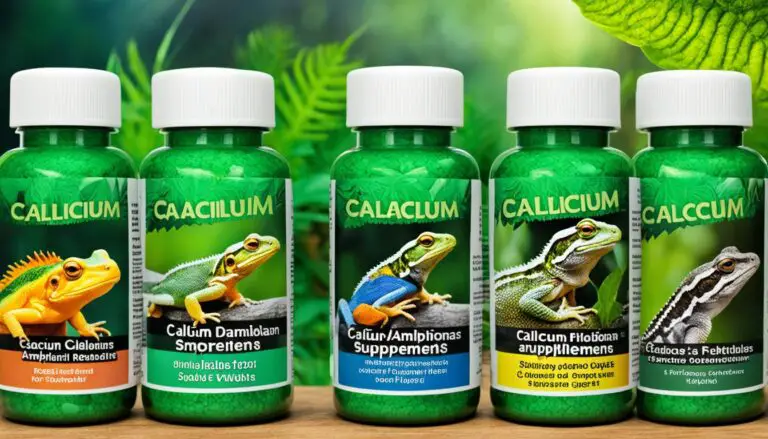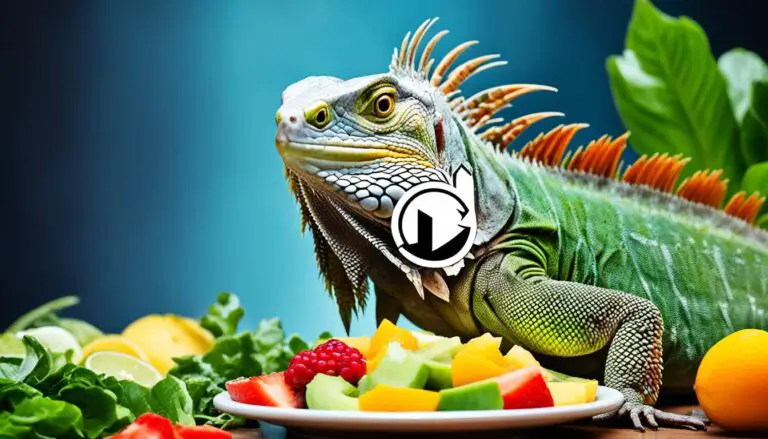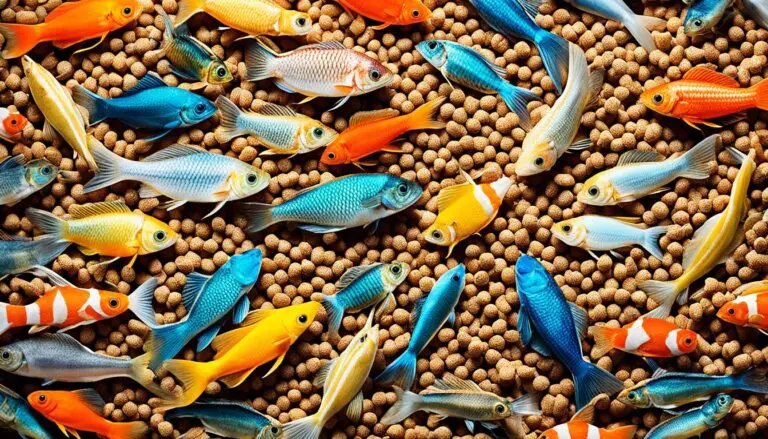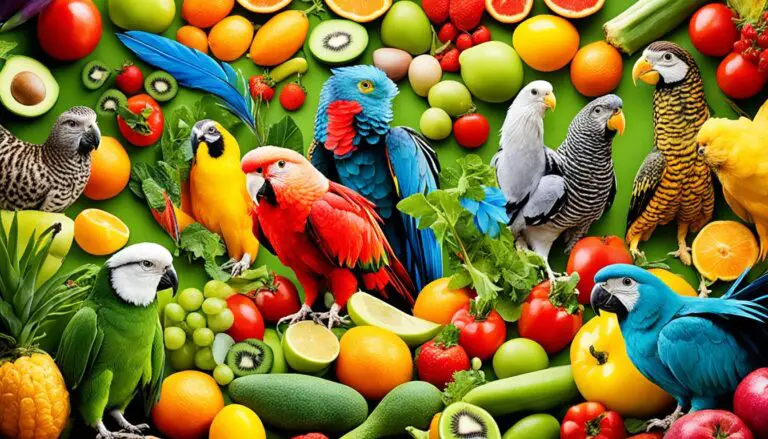Nutrition for Senior Exotic Pets: Key Tips
Did you know that what senior exotic pets eat can hugely affect their health and how long they live? As these special pets get older, their diets need to change. This ensures they get all the right nutrients to stay healthy.
This article looks into why feeding senior exotic pets is so important. We’ll share tips to make sure your senior pets get the best care. From understanding how they age to what they should eat, we will cover everything.
Key Takeaways:
- Proper nutrition is crucial for the health and well-being of senior exotic pets.
- As exotic pets age, their dietary needs change, requiring specialized attention.
- Understanding the aging process helps tailor their nutrition for optimal health.
- Essential nutrients are necessary to support the aging bodies of exotic pets.
- Geriatric exotic pets may require unique dietary considerations due to age-related conditions.
Understanding the Aging Process in Exotic Pets
Exotic pets grow older just like we do. Their bodies change, which means we need to change their food too. Knowing how their needs shift with age is key to helping them stay healthy.
As exotic pets get older, their digestion and metabolism change. This means their food needs also change. Tailoring their diet to fit their age helps them stay well.
Older exotic pets need special care when it comes to what they eat. They need less energy but still require nutrients for their health. A balanced diet is crucial for their well-being.
There are important things to consider when feeding elderly exotic pets. Here are some tips to help keep them healthy and happy:
- Regular vet visits are crucial. A vet who knows about exotic pets can offer great advice. They will check your pet’s health and suggest any necessary diet changes.
- Use food formulated for their age. There are special foods for older pets that are easier to digest and support joint and brain health. These options are important for their specific needs.
- A balanced diet is vital. Their meals should have protein, fats, carbs, and essential nutrients. Always check with your vet to make sure the diet is right for your pet.
- Adjust meal sizes and frequency. Older pets might not eat as much. Feed them smaller, more frequent meals. This helps prevent weight gain and supports digestion.
- Watch their water intake. Keeping your pet hydrated is crucial. If they find it hard to drink, try offering water in a different way, like a shallow dish or a fountain.
Knowing how to feed aging exotic pets is important. By using these tips and understanding their changing dietary needs, we can help them live longer, happier lives. With a diet tailored to their age, they can stay active and healthy.

Essential Nutrients for Senior Exotic Pets
As exotic pets get older, what they eat becomes super important for health and energy. They need a unique diet as they age, so they stay healthy. Let’s look at what older exotic pets need to eat to keep thriving.
1. Protein: For strength and to stay healthy, older exotic pets should get good protein. This means eating things like lean meats, poultry, fish, and also some plant-based proteins. Legumes and tofu are great protein sources for them.
2. Fiber: Since senior exotic pets digest food slower, fiber is key. It keeps their stomach working well and stops constipation. Things such as leafy greens, veggies, and fruits help keep their digestion healthy.
3. Antioxidants: Antioxidants keep the body young by fighting off harmful stuff. Feeding them antioxidant-rich foods like berries, broccoli, and spinach boosts their immune system and health.
4. Omega-3 Fatty Acids: Omega-3s are great for joint health, brain function, and a shiny coat. Give them sources like fish oil, chia seeds, and flaxseeds for a health boost.
5. Vitamins and Minerals: Older exotic pets need extra vitamins and minerals to stay healthy. A balanced diet with plenty of fruits and veggies does the trick. You can also add an exotic pet supplement to cover all their needs.
Keep in mind, the dietary needs of exotic pets can vary, so a vet should help. They will create a diet made just for your pet, taking into account its type, size, and health.
The Importance of Water
Water is also very important for senior exotic pets. It keeps them healthy, regulates their temperature, and helps their organs work right. Make sure they always have access to fresh water.
Make water easy to get to for your pet by using bottles or dishes. Some pets like flowing water more. If yours does, try a water source with a gentle flow to encourage drinking.
“Proper nutrition is the cornerstone of optimal health in senior exotic pets. Providing them with a balanced diet rich in essential nutrients and ensuring adequate hydration can significantly enhance their quality of life.” – Dr. Jane Thompson, Exotic Pet Veterinarian

Giving your older exotic pet the right diet and enough water is crucial. It helps them stay healthy as they get older. Next, we’ll share feeding tips and more to make life great for your geriatric exotic pet.
Meeting the Unique Nutritional Needs of Geriatric Exotic Pets
Exotic pets, like us, need special diets as they grow older. This is especially true for senior exotic pets. They require balanced nutrition to stay healthy. Let’s look at how to provide for our aging exotic friends.
Maintaining ideal weight is key for senior exotic pets. Being overweight can make their health issues worse and hurt their joints. Too much weight loss, though, could signal a hidden health trouble. Regular vet visits help keep an eye on your pet’s weight and health.
It’s important to know what older exotic pets need in their diet. For example, they might need more antioxidants and omega-3s. These can help them stay healthy and enjoy life. Adjusting their food to meet these needs is crucial.
On top of a good diet, your older pet might need supplements. Talk to your vet to see if they’re necessary. Remember, not all pets need them. Always follow your vet’s advice about supplements.
Staying hydrated is vital for senior pets. Dehydration can lead to serious problems. Make sure your pet always has fresh water. Wet food can also up their water intake.
Don’t forget to take your older pet for regular check-ups. These visits are essential for their health. Your vet can offer advice on diet and exercise. They can also help with any other care your pet might need.
Here are some practical tips to meet the unique nutritional needs of geriatric exotic pets:
- Consult with a qualified exotic veterinarian or an exotic pet nutritionist to create a customized diet plan for your senior pet.
- Incorporate high-quality, age-appropriate commercial pet food into their diet. Look for brands that specifically cater to the nutritional needs of older animals.
- Ensure their diet includes a variety of fresh fruits, vegetables, and lean proteins to provide essential vitamins and minerals.
- Consider feeding your pet smaller, more frequent meals throughout the day to aid digestion and energy levels.
- Monitor their weight regularly and make any necessary adjustments to their diet to maintain a healthy body condition.
- Provide mentally stimulating activities and environmental enrichment to keep your pet’s mind active and engaged.
- Keep an eye out for any changes in their appetite, weight, or behavior, and promptly seek veterinary attention if you notice anything concerning.
Understanding and meeting the unique nutritional needs of geriatric exotic pets is crucial. With the right care and diet, they can live healthy, fulfilling lives even in old age. Our care plays a big part in how well they age.
“As exotic pets age, their nutritional needs change, and it’s crucial to adapt their diet to support their overall health and wellness.”
| Nutritional Needs of Geriatric Exotic Pets | How to Meet Them |
|---|---|
| Weight Management | Regular veterinary check-ups to monitor weight, proper portion control, and a balanced diet. |
| Specific Nutrient Requirements | Tailor their diet to include higher levels of antioxidants and omega-3 fatty acids to support joint and cardiovascular health. |
| Supplements | Consult with a veterinarian to determine if your pet would benefit from any specific supplements or vitamins. |
| Hydration | Ensure access to fresh water at all times and consider incorporating wet food into their diet. |
| Veterinary Check-ups | Regular visits to monitor health, receive professional advice, and address any concerns. |

Practical Feeding Tips for Senior Exotic Pets
Feeding older exotic pets needs extra care. As pets get older, they need a different diet. This means making some changes to what they eat. Here’s how you can ensure they get the right nutrition:
1. Schedule Regular Vet Check-ups
Senior exotic pets need to see the vet often. These check-ups help the vet look at their health. They will also give you tips on what to feed them. Tell your vet about any new eating habits your pet has.
2. Choose Food Specifically Formulated for Senior Exotic Pets
Make sure the food you pick is made for senior exotic pets. These foods have the right kinds and levels of nutrients, vitamins, and minerals. Look for “senior” or “geriatric” on the label. This shows it’s the right choice.
3. Consider Specialized Supplements if Recommended
Your vet might suggest extra supplements for your pet. These can help with joint and heart health, and make your pet feel better overall. Always talk to your vet before adding any supplements to their diet.
4. Monitor Portion Sizes
Older exotic pets are often less active, so they need fewer calories. Keep an eye on how much they eat, to stop them from getting too heavy. Your vet can help you figure out the right amount for your pet.
5. Offer a Variety of Fresh Foods
Adding fresh food can keep your pet’s meals interesting. Try mixing in fruits, veggies, and safe foods from their diet plan. Always check which foods are okay for your pet before giving them something new.
These tips will help you feed your senior exotic pets well. Remember, every pet is unique. Working with your vet to make a personal diet plan is the best way to keep them healthy and happy.

“Feeding older exotic pets requires careful consideration. These tips will help you give a balanced and nutritious diet to your senior exotic pets. This is key for them to age well and enjoy life.”
Maintaining Weight and Body Condition in Aging Exotic Pets
Keeping older exotic pets at a healthy weight is vital for their health and happiness. Animals, like people, see changes in metabolism and muscle as they age. This can affect how much they weigh and their body shape.
It’s important to feed senior pets the right foods. A good diet gives them all the nutrients they need. It also helps them keep their weight in check. Here are some ways to do this.
1. Monitor their calorie intake:
Watch how many calories your older exotic pet eats. A vet who knows about these pets can help set up a diet plan. This plan will match their species, age, and how active they are. Make sure their meals are just right to avoid them getting too heavy or too light.
2. Focus on nutrient-dense food:
Pick top-quality food made for older exotic pets. These foods give them the best nutrition and are easy to digest. Choose foods high in protein, plus lots of vitamins and minerals. This will keep them healthy all over.
3. Consider portion control:
Feeding older pets little and often can support their weight. Spread their meals through the day to stop them eating too much at once. This trick boosts digestion. For the best portion sizes, always ask your vet.
4. Offer appropriate treats:
It’s fine to give pets treats, but pick healthy ones. Choose snacks that won’t add too many calories. Too many treats may cause weight gain and unhealthy eating habits.
Each exotic pet is different. They might need a special diet. Check in with the vet often to be sure your pet is doing well. They can change your pet’s diet as needed to stay healthy.
| Benefits of Maintaining Weight and Body Condition in Aging Exotic Pets | Risks of Weight Gain in Aging Exotic Pets |
|---|---|
|
|
Hydration for Aging Exotic Pets
Keeping senior exotic pets well-hydrated is vital for their health. As they get older, changes in their bodies can make them more prone to dehydration. We’ll look into ways to keep these exotic pets hydrated. This is essential for their well-being.
Why is Hydration Important for Aging Exotic Pets?
For older exotic pets, staying hydrated is key for good health. It helps keep body temperature in check and aids digestion. Hydration also moves nutrients around the body and helps remove waste. Without enough water, they can face many health problems, like issues with their organs and moving around.
Older exotic pets might not keep water in their bodies as well. They also might not feel so thirsty. So, it’s important to watch how much they drink and help them get more fluids when needed.
Strategies for Ensuring Hydration
Here’s how to make sure your aging exotic pet drinks enough:
- Always have fresh, clean water available in a shallow bowl. Change it often so it stays clean and your pet wants to drink it.
- Add fruits and veggies to their diet. Talk to your vet first to make sure these foods are safe for your pet.
- Use moisture-holding materials in their living space. This keeps the air humid and stops them from losing too much water through their skin and breath.
- Keep certain pets’ habitats humid with misters or humidifiers. This helps them not dry out.
- Try offering flavored water or a bit of low-sodium broth if they don’t like plain water. This can make water more appealing.
Monitoring Hydration
It’s important to check if your exotic pet is drinking enough. Signs they might be dehydrated include:
- Loose skin
- Dry gums
- Tiredness
- Less pee
- Sunken eyes
Do these signs sound familiar? Then, you should see your vet. They can check for dehydration and treat it, often through fluids.
Ensuring your aging exotic pet gets enough water is crucial for their health. With good care and checking on their water intake, they can live well and stay healthy. This is how you help them have a good life, even as they get older.
Supplements and Nutritional Support for Older Exotic Pets
Exotic pets change what they need as they get older. Adding supplements and special food to their meals can help them stay healthy longer. We’ll look at what kind of help is out there for older exotic pets.
Types of Supplements
Older exotic pets might not get everything they need from their food. That’s where supplements can help. Here are a few types that could be good for them:
- Multivitamins and Minerals: They make sure your pet gets all their vitamins and minerals.
- Joint Health Supplements: For pets with creaky joints, these can be a big help.
- Omega-3 Fatty Acids: Good for skin, cuts down on swelling, and helps the heart.
- Probiotics: They’re good for the gut and the immune system.
Specialized Nutrition for Aging Exotic Pets
There are also special foods made just for older exotic pets. These meals are designed to give them what they specifically need. Look for foods that are full of:
- High-quality protein: Keeps muscles strong and supports organs.
- Healthy fats: Gives energy and keeps the mind sharp.
- Antioxidants: These fight off bad stuff in the body and keep your pet healthy.
- Joint-supporting nutrients: Some foods have ingredients like glucosamine to help with joints.
Before you add anything new to your pet’s diet, talk to your vet. They know what’s best for your pet and can recommend the right stuff. Always see the vet first.
Don’t forget, these special foods and supplements are extra. They’re not a meal on their own. So, mix them with good food to make sure your pet has a balanced diet.
Common Supplements for Older Exotic Pets
| Supplement | Benefits |
|---|---|
| Multivitamins and Minerals | Ensures proper nutrient intake |
| Joint Health Supplements | Supports joint health and mobility |
| Omega-3 Fatty Acids | Promotes skin and coat health, reduces inflammation |
| Probiotics | Enhances digestive health and immune function |
Specialized Diets for Elderly Exotic Pets
Some senior exotic pets have special dietary needs. It’s vital to meet these needs for their health. A specialized diet can make sure they do well as they get older.
Senior exotic pets need diets that fit their age, species, and health issues. A custom diet can tackle problems related to aging. It also stops future health troubles.
The best diet for older exotic pets is full of nutrients that help them age healthily. This means the right amount of proteins, carbs, fats, and vitamins. It keeps their body working well and them lively.
Older exotic pets might do better with a diet made just for them. These diets help their joints, brain, and digestion. They are packed with what these pets need at this stage.
Older exotic pets often need less energy. So, they should get food that’s not too high in calories. Setting the right meal sizes and times can keep them fit and well.
Always talk to a vet who knows about exotic pets. They can suggest the perfect diet. This could be a special pet food or a diet you make yourself.
Making sure your elderly exotic pet eats right is key. It boosts their life quality and makes their late years great.
Conclusion
Feeding exotic pets as they get older is very important. Knowing what they need to eat as they age is crucial. This means giving them a diet tailored just for them. This will help older pets stay healthy and happy.
Old exotic pets need the right food to keep them in good shape. A proper diet keeps their weight right and helps them stay hydrated. It also gives them the nutrients necessary for health and activity. Following expert advice can make their lives better and longer.
As exotic pets age, their diets must change too. They might need special food, supplements, or other help to stay well. Focusing on their nutrition ensures they enjoy many more years of life.
FAQ
Why is nutrition important for senior exotic pets?
What are the key dietary considerations for geriatric exotic pets?
What are the essential nutrients needed by senior exotic pets?
How can I meet the unique nutritional needs of geriatric exotic pets?
What are some practical feeding tips for senior exotic pets?
How can I maintain weight and body condition in aging exotic pets?
How can I ensure proper hydration for my aging exotic pet?
Are supplements and nutritional support necessary for older exotic pets?
Are there specialized diets available for elderly exotic pets?
Why is proper nutrition important for senior exotic pets?
Peter Stones is the founder of Exotic Pets Place, the leading online resource for exotic pet care information.
With over 10 years of hands-on exotic pet ownership experience, he is deeply passionate about sharing his expertise to help others properly care for their unusual pets.
When he's not writing extensively researched articles or connecting with fellow exotic pet enthusiasts worldwide, you can find Peter at home tending to his own beloved menagerie of exotic animals.

